Previewing Maxiotek's MK8115 SSD Controller: Can DRAM-less Drives Make The Cut?
by Billy Tallis on May 9, 2017 8:00 AM ESTSequential Read Performance
The sequential read test requests 128kB blocks and tests queue depths ranging from 1 to 32. The queue depth is doubled every three minutes, for a total test duration of 18 minutes. The test spans the entire drive, and the drive is filled before the test begins. The primary score we report is an average of performances at queue depths 1, 2 and 4, as client usage typically consists mostly of low queue depth operations.
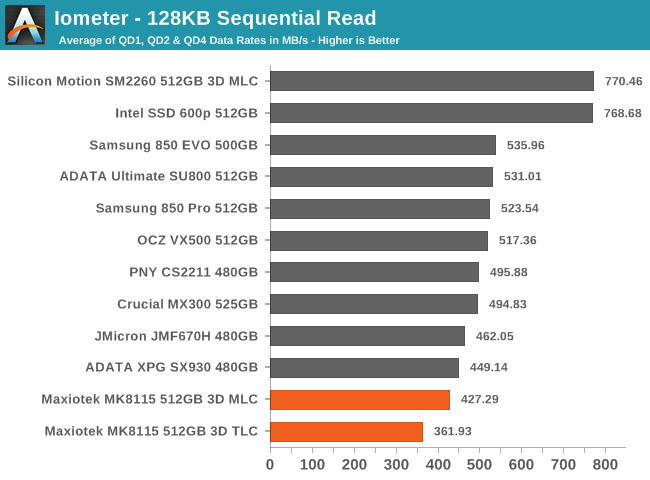
The two MK8115 drives land at the bottom of the performance rankings again for the sequential read test. They aren't really close to saturating the SATA 3 link at low queue depths, but both do at least offer significantly higher throughput than a SATA 2 link could provide, and the fact that the competition is limited by SATA 3 means the MK8115 drives fall behind by a smaller percentage than would otherwise be the case.
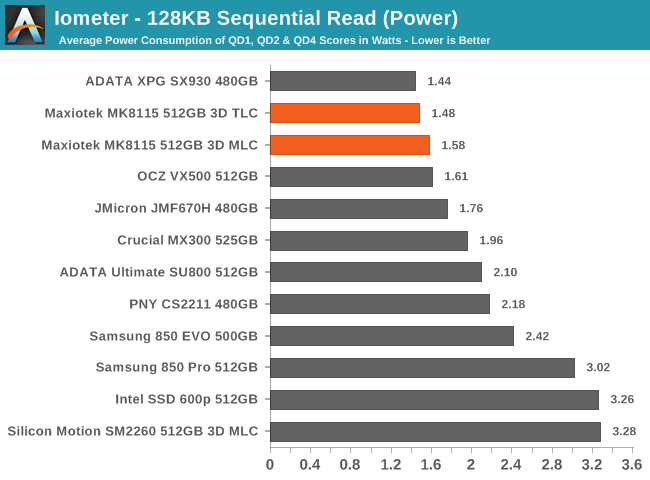
To go with their low performance the MK8115 drives offer almost the lowest power consumption, so the power efficiency is at least reasonable. The ADATA SX930 based on the JMicron JMF670H controller manages to deliver higher throughput with less power, so the lack of a DRAM cache seems to be hurting more than helping efficiency on this test.
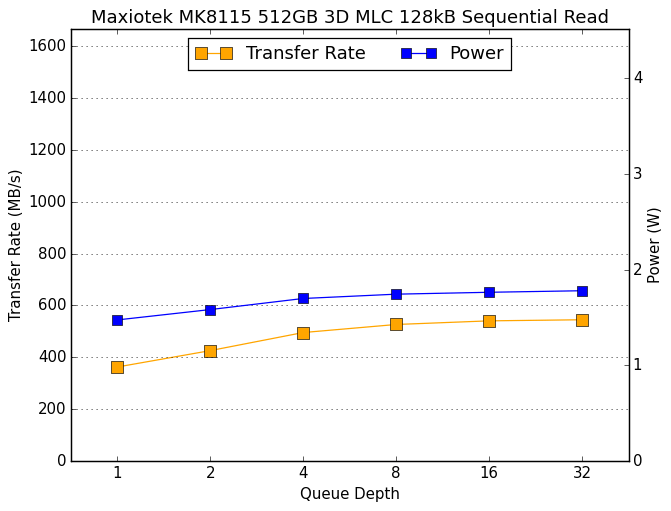 |
|||||||||
Like most SATA drives, the performance scaling as queue depth increases is mostly flat. There's slight performance growth all the up to QD16 while many SATA SSDs are able to offer their full sequential read throughput at QD2.
Sequential Write Performance
The sequential write test writes 128kB blocks and tests queue depths ranging from 1 to 32. The queue depth is doubled every three minutes, for a total test duration of 18 minutes. The test spans the entire drive, and the drive is filled before the test begins. The primary score we report is an average of performances at queue depths 1, 2 and 4, as client usage typically consists mostly of low queue depth operations.
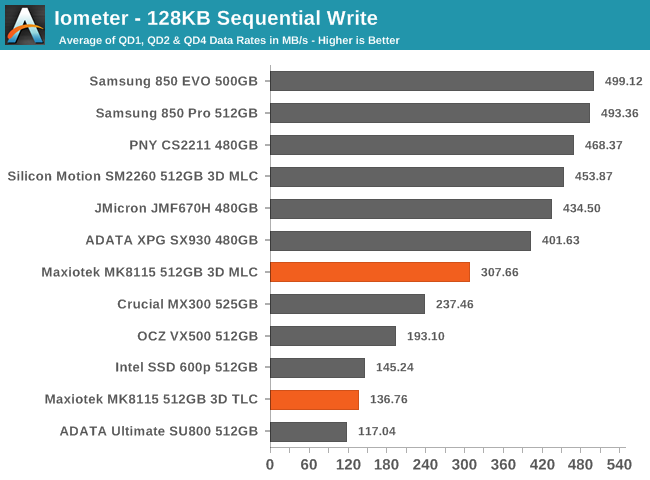
The sequential write test reveals one of the biggest gaps between the MLC and TLC based MK8115 drives. The TLC drive is almost the slowest drive on this test, but the MLC drive is more than twice as fast and outperforms most TLC SSDs while not quite matching typical MLC performance.
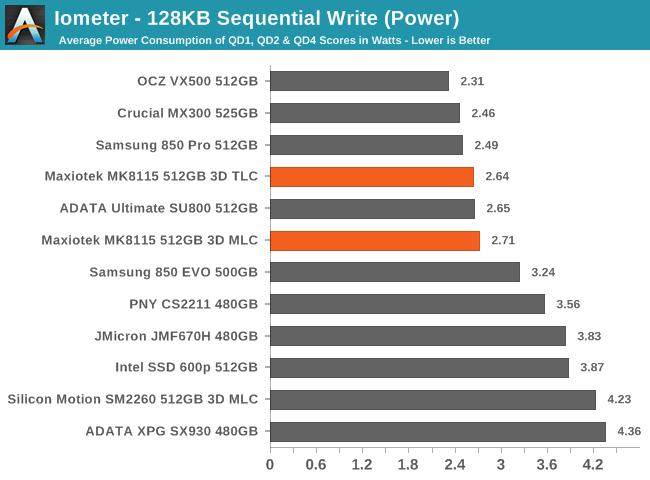
Both MK8115 drives had similar power consumption on the sequential read test, revealing the MLC drive to be far more efficient but still nothing great compared to the competition.
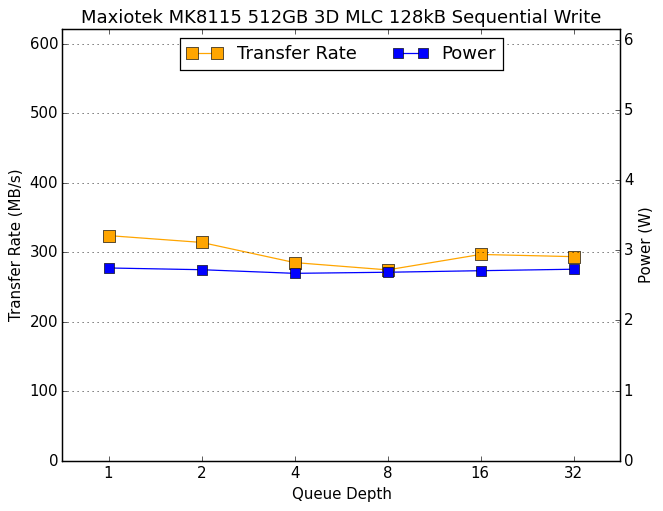 |
|||||||||
The MK8115 drive with MLC experiences a bit of trouble near the middle of the sequential write test, as write speeds drop slightly, but by the end of the test they've mostly recovered and power consumption has been constant across queue depths.










60 Comments
View All Comments
jardows2 - Tuesday, May 9, 2017 - link
I fondly remember when new developments in SSD products resulted in lower prices AND better performance. Now it seems that every new product is geared only for lower prices, and the performance is getting worse! Not to mention that the prices have gone up substantially in the past year, I don't think we are at the best value time for SSD's.MajGenRelativity - Tuesday, May 9, 2017 - link
Can you provide evidence of performance getting worse? I haven't seen groundbreaking performance strides in anything but high-end/upper-mid (Samsung 960 series), but I haven't seen a performance regression.Sonic01 - Tuesday, May 9, 2017 - link
i actually found this today, i was looking for a new budget 1tb SSD.my current is a crucial m500 from 2013 i bagged for about £450, now the cheapest 1tb ss'd are about £300 but overall performance is about 30% of the m500..... in 4 years they have dropped 30% of the cost at the expense of 60% of the speed...
MajGenRelativity - Tuesday, May 9, 2017 - link
I looked on amazon.co.uk and the Samsung 850 Evo is 300 for 1TB. I also paged around in Anandtech reviews, and it has better performance than the M500, sometimes significantly so. The MX300 is 250 for 1TB, and it also scores very well on reviews, although I didn't do a very thorough comparison to the M500, it seems a little lower in performance compared to the 850Evo, which should still put it slightly ahead of the M500AlphaBlaster - Sunday, May 14, 2017 - link
That embecil Comey wanted to grab and be in the headlines, and he was manipulating evidence, etc ,and non-evidence, etc.to accomplish that. That's just one thing. He has no integrity. He showed himself to be just another Washington stooge. Hoover was also another Washington stooge and a degenerate, but was fired by the president that committed the crime that he fired Hoover for. If some entity could lob a couple of nukes onto Washington DC when whatever worthless miscreant president at the time is addressing both houses of congress, it would be a blessing!CheapSushi - Wednesday, May 10, 2017 - link
The big difference is the Crucial M500 is MLC NAND and the Samsung 850 EVO and similar cheaper ones are TLC NAND. TLC is inherently slower than MLC; always. It's 2 bits per cell vs 3 bits per cell. It's an important distinction when comparing SLC, MLC, TLC and soon QLC. Maybe you didn't know?extide - Wednesday, May 10, 2017 - link
Yeah, but the 850 is also using #d TLC, not planar TLC, and 3D TLC is a lot faster than planar TLC. Maybe you didn't know?extide - Wednesday, May 10, 2017 - link
#d is supposed to be 3D, of courselowlymarine - Wednesday, May 10, 2017 - link
If only the very site you were on had some sort of database of benchmarks you could check to see that, in fact, the 850 EVO is massively faster than the M500. Oh hey, look what I found! http://www.anandtech.com/bench/product/805?vs=1398MajGenRelativity - Thursday, May 11, 2017 - link
The 850 Evo is faster though, so I'm not sure what you're trying to say